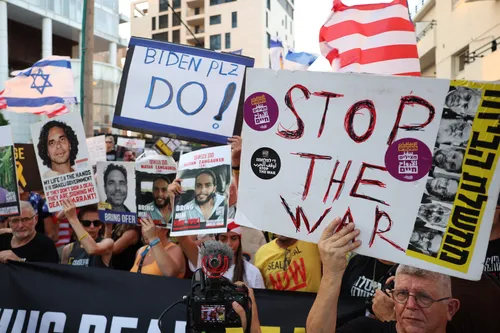Among the topics that will be discussed during the G20 presidents’ meeting in Rio de Janeiro in November 18th and 19th, the massacre committed by Israel against the Palestinian population in the Gaza Strip – considered genocide by more than 50 countries that support South Africa’s action against Israel in the International Court of Justice (ICJ) – represents the main challenge for the leadership of Brazil, which is chairing the group this year.
The Office of the United Nations High Commissioner (UNHCR) announced on Friday (8) that it had counted 8,119 of the more than 34,000 deaths recorded during the first six months of the Israeli massacre in the Gaza Strip and concluded that “almost 70% were children and women”.
The Israeli offensive in Gaza has already caused at least 43,469 deaths, mostly civilians, according to figures from the Hamas government’s Health Ministry in Gaza, considered reliable by the UN.
The issue generates divisions in the group, and despite having raised its voice against the government of Israeli Prime Minister Benjamin Netanyahu, Brazil has the challenge of making progress in relation to coordinated action by these countries against the Israeli offensive.
But this position is considered too little, too late in the face of the advancing conflict in the region, with Israel’s military offensive in Lebanon from September and attacks on Syria and Iran.
Mohammed Nadir, professor of International Relations and the Middle East at a Federalista University in the greater São Paulo area, the G20 is an opportunity for Lula to advance agendas of interest to the Global South and assert himself as a regional leader. “Brazil will take advantage of this moment to defend, in a way, a reform of the Security Council [of the UN], an opportunity for it to defend its interests. And Lula will try to score points in this sense as the undisputed leader of the Global South.”
Trump’s victory in the US presidency, however, is likely to weaken Brazil’s agenda at the G20. Regarding the Gaza Strip, the [republican’s] promise to “end the war” in the region, made during his election campaign, means in practice increasing financial and military support for Israel in order to guarantee its victory in the region, with the consequent expulsion of the Palestinian population from the enclave.
Dispute
Together, the G20 countries represent 80% of the global economy and among them are Israel’s main supporters, such as the US, the UK and Germany. On the other hand, the group includes countries critical of the Israeli regime, such as South Africa, Brazil, Mexico, Russia and Turkey.
Mohammed Nadir points out that even right-wing governments like the French or the Italian have recently voiced criticism of Israel. “There have been very strong voices even within the countries of the Global North criticizing Israel’s position and wars in the region. I think South Africa is going to be very critical of the massacre in Gaza and reiterate the accusations of genocide against Israel,” says Nadir.
At the end of October, South Africa submitted a memorial to the ICJ regarding its ongoing case against Israel with 725 pages of allegations and 4,000 pages of annexes. “We have too much evidence,” South Africa’s representative in The Hague, Ambassador Vusimuzi Madonsela, told the news agency Al Jazeera.
Apart from South Africa, the most significant stance against Israel in the context of the G20 is expected from Saudi Arabia. In 2023, the Islamic monarchy was negotiating an agreement with the US that included the normalization of diplomatic relations with Israel, but suspended negotiations after the start of the Israeli massacre in the Palestinian territory.
In the last week of October, the Crown Prince and ruler, Mohamed bin Salman, stated that the country will not establish diplomatic relations with Israel without the prior “creation of a Palestinian state”, and condemned the “crimes” of Israeli forces in the Gaza Strip.
“I believe that Saudi Arabia will mainly get involved and reiterate its classic position, which is to defend and condition any reconciliation with Israel on the creation of a Palestinian state. This is Saudi Arabia’s traditional position, and it will repeat this and therefore put more pressure on Israel to stop the war,” Nadir says.
War industry
Despite its position as a mediator in the conflict, the US remains Israel’s main political and military ally, and last month guaranteed US$ 8.7 billion in aid for the Israeli military offensive, in the face of the escalating conflict in the Middle East. In addition to the Gaza Strip, Israel has expanded its attacks to Lebanon, Syria and Iran.
The Israeli Defense Ministry says it has already received $ 3.5 billion for critical military purchases, while the remaining $ 5.2 billion will go towards air defense systems. It was also the US veto that prevented ceasefire attempts at the very beginning of the conflict, one of which was proposed by Brazil.
Two months ago, the UK suspended the sale of some weapons to Israel, according to Foreign Secretary, David Lammy, of the newly-elected Labor government: 30 of the 350 arms export licenses were suspended by the argument that a “clear risk” that the equipment could be used to commit serious violations of international law.
In Brazil, the Army backed out of the purchase of 36 armored vehicles from the Israeli company Elbit Systems, in a visar for R$1.2 billion opened in April this year. The actions, however, are pointed out as insufficient by popular movements and organizations in defense of the Palestinian population.
However, Brazil maintains diplomatic relations with Israel
Brazilian President Luiz Inácio Lula da Silva has been one of the strongest voices on the international stage against the Israeli military offensive, and his government recalled its ambassador to Israel in May, without appointing a replacement so far.
Diplomatic tension increased after Lula accused the Israeli government in February of committing “genocide” in the Gaza Strip. Israel declared Lula “persona non grata“.
Despite raising his voice against the Israeli government, Lula has been urged by Palestinian organizations and social movements to take concrete measures against Israel – such as breaking off diplomatic relations.
During his participation in the BRICS meeting in Russia later last month, Foreign Minister Mauro Vieira stated that the Brazilian government does not intend to break off relations, in order to keep alive the possibility of being a mediator in the conflict.
In his final assessment of the meetings, Brazilian foreign minister said that a “large number of countries from all regions expressed concerns about the conflict in Palestine, highlighting the risk of it spreading to neighboring countries.”
Edited by: Rodrigo Durão Coelho





























































